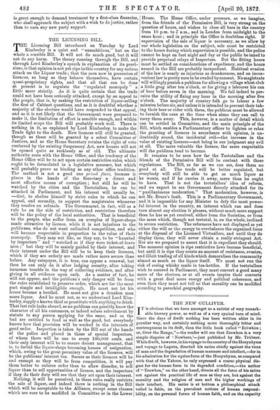THE LICENSING BILL.
Nothing, it will be perceived, in these rules really restricts the sale of liquor, and indeed there is nothing in the Bill which will be acceptable to the Alliance, except some clauses which are sure to be modified in Committee or in the Lower House. The Home Office, under pressure, as we imagine, from the friends of the Permissive Bill, is very strong on the question of hours, and wishes to close all bars in the country
from 10 p.m. to :7 a.m., and in London from midnight to the same hour ; and in principle the Office is doubtless right. If
supervision of the sale of liquor is necessary, as we allow by our whole legislation on the subject, sale mast be restricted to the hours daring which supervision is possible, and the police cannot be kept on foot night and day or the public be taxed to provide perpetual relays of Inspectors. But the fitting hours must be settled on considerations of expediency, and the hours
named in the Bill are probably inexpedient. Habitual evasion of the law is nearly as injurious as drunkenness, and an incon- venient law is pretty sure to be evaded by consent. No magistrate will willingly punish a publican for allowing a village whist club a little grog after ten o'clock, or for giving a labourer his can of beer before seven in the morning. We fail indeed to per- ceive the utility of fixing any hour in the morning after five o'clock. The majority of country folk go to labour a few minutes before six, and unless it is intended to prevent their tak- ing their beer or cider with them, the publican must be allowed to furnish the cans at the time when alone they can call to carry them away. This, however, is a matter of detail which can be settled in Committee, and the main principle of the Bill, which enables a Parliamentary officer to tighten or relax the granting of licences in accordance with opinion, is un- doubtedly sound, the incidental evil—the increase in the value of existing licences—not being in our judgment any evil at all. The more valuable the licence, the more respectable will the publican tend to become.
It remains to be seen how far the Teetotallers and the friends of the Permissive Bill will be content with these regulations. The Bill, as far as we can see, does them no
good at all. The trade will be better regulated, but everybody will still be able to get as much liquor as he wants, and if he carries it away, more than he ought to have. That is not the teetotallers' idea of reform, and we expect to see Government fiercely attacked for its " pusillanimous moderation." That moderation, however, is not Mr. Bruce's fault. This is a Parliamentary Government, and it is impossible for any Minister to defy the most power- ful interest in the country, an interest which can and does turn almost any election it pleases, without much more support than he has as yet received, either from the Societies, or from the mass which, though not teetotal, is, on the whole, inclined to severe restriction. The reformers have not displayed as yet either the will or the energy to overbalance the organized force at the disposal of the Licensed Victuallers, and until they do display them, they will never obtain a really' stringent Act. Nor are we prepared to assert that it is expedient they should. The moment opinion is ripe restrictive laws become beneficial, but until it is ripe they create an amount of resistance, evasion, and illicit trading of all kinds which demoralises the community almost as much as the liquor itself. We must not ran the risk of seeing whisky made in tea-kettles. If the teetotallers wish to succeed in Parliament, they must convert a good many more of the electors, or at all events inspire their converts with a great deal more energy and political coherence, and even then they must not tell us that morality can be modified according to parochial geography.


































 Previous page
Previous page